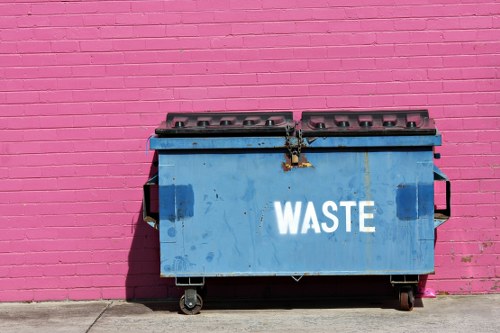Construction Waste Clearance in Shadwell: Efficient Solutions for a Cleaner Future
Understanding Construction Waste Clearance

Construction projects, whether large or small, generate a significant amount of waste. Proper construction waste clearance in Shadwell is essential to maintain a clean environment and ensure the smooth progression of building activities. Efficient waste management not only benefits the community but also adheres to local regulations.
Shadwell, being a bustling area with numerous construction sites, faces challenges in managing construction debris. Implementing effective waste clearance strategies helps in minimizing environmental impact and promotes sustainability within the industry.
From demolition debris to leftover materials, understanding the types of construction waste is the first step towards effective clearance and recycling.
The Importance of Waste Clearance

Effective waste clearance is crucial for several reasons. It ensures that construction sites remain safe for workers and the surrounding community. Accumulated waste can pose safety hazards, including the risk of accidents and injuries.
Moreover, proper waste management can lead to significant cost savings. By recycling materials such as metal, wood, and concrete, construction firms can reduce the costs associated with purchasing new materials.
Environmental preservation is another key aspect. Proper disposal and recycling of construction waste help in reducing the overall carbon footprint and conserving natural resources.
Types of Construction Waste

Construction waste can be broadly categorized into:
- Concrete and Masonry: Debris from demolished structures.
- Wood: Offcuts and scrap from framing and carpentry.
- Metals: Surplus and leftover metal materials.
- Plastics and Packaging: Materials used for shipping and storage.
- Hazardous Waste: Batteries, paints, and other potentially harmful substances.
Identifying the types of waste is essential for determining the appropriate clearance and recycling methods.
Each category of waste requires specific handling to ensure compliance with local regulations and environmental standards.
Methods of Waste Clearance

There are several approaches to construction waste clearance in Shadwell, including:
- On-site Sorting: Separating waste materials at the source for easier recycling.
- Professional Waste Clearance Services: Hiring experts to manage the entire clearance process.
- Recycling Facilities: Transporting sorted waste to specialized recycling centers.
- Landfill Disposal: Properly disposing of non-recyclable waste in designated areas.
Choosing the right method depends on the type and volume of waste, as well as budget and environmental considerations.
Professional services often provide comprehensive solutions, ensuring that waste is handled efficiently and responsibly.
Benefits of Hiring Professional Clearance Services

Opting for professional waste clearance services offers numerous advantages:
- Efficiency: Professionals have the expertise and equipment to clear waste swiftly.
- Compliance: Ensures adherence to local regulations and environmental laws.
- Safety: Reduces the risk of accidents by handling hazardous materials properly.
- Cost-Effective: Minimizes long-term costs through effective recycling and disposal strategies.
- Environmental Impact: Promotes sustainable practices by prioritizing recycling and responsible disposal.
Investing in professional services can lead to a more streamlined construction process and a healthier community environment.
Additionally, professionals can offer tailored solutions to meet the specific needs of each project.
Local Regulations in Shadwell

Shadwell has specific regulations governing construction waste management. It's imperative for construction firms to be aware of and comply with these laws to avoid penalties and ensure sustainable practices.
Key regulations include:
- Proper segregation of waste at the source.
- Timely removal and disposal of construction debris.
- Mandatory recycling of certain materials.
- Adherence to environmental protection standards.
Staying informed about local policies helps in maintaining compliance and promoting environmentally friendly construction practices.
Failure to comply can result in fines and project delays, highlighting the importance of effective waste management strategies.
Recycling and Disposal Options

Recycling is a cornerstone of sustainable construction waste management. In Shadwell, several facilities and services specialize in processing construction debris.
Common recycling options include:
- Metal Recycling: Salvaging and reusing metals from construction sites.
- Concrete Crushing: Breaking down concrete for reuse in new projects.
- Wood Recycling: Utilizing scrap wood for various applications.
- Plastic Recycling: Processing plastic waste into usable materials.
For non-recyclable waste, responsible disposal methods are essential to minimize environmental impact.
Choosing recycling over landfill disposal not only conserves resources but also supports the circular economy within the construction industry.
Cost Considerations

Managing the costs associated with construction waste clearance is vital for project budgeting.
Factors influencing costs include:
- The volume and type of waste generated.
- Distance to recycling or disposal facilities.
- Labor and equipment required for clearance.
- Compliance with local regulations.
Investing in efficient waste management can lead to long-term savings by reducing material costs and avoiding penalties.
Obtaining quotes from multiple service providers can help in finding cost-effective solutions tailored to specific project needs.
Contact us today to get a personalized estimate for your construction waste clearance needs in Shadwell.
Tips for Effective Waste Management
Implementing best practices can significantly enhance the efficiency of construction waste clearance:
- Plan Ahead: Incorporate waste management strategies during the project planning phase.
- Educate the Team: Train workers on proper waste segregation and disposal techniques.
- Use Recycling Bins: Provide designated containers for different types of waste.
- Monitor and Audit: Regularly review waste management processes to identify areas for improvement.
By following these tips, construction projects can achieve more sustainable and cost-effective outcomes.
Booking your service now ensures that your project adheres to these best practices from the outset.
Conclusion: Building a Sustainable Shadwell
Effective construction waste clearance in Shadwell is essential for fostering a sustainable environment and promoting responsible building practices. By understanding the types of waste, adhering to local regulations, and utilizing professional services, construction projects can minimize their environmental footprint and contribute to the community's well-being.
Embracing sustainable waste management not only benefits the environment but also enhances the reputation and efficiency of construction firms. As Shadwell continues to grow, prioritizing waste clearance will play a pivotal role in shaping a cleaner and greener future.
Don’t wait—contact us today to ensure your construction projects align with sustainable practices and contribute positively to Shadwell’s development.